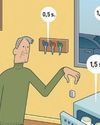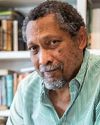Prøve GULL - Gratis
Artificial Intelligence: Driving The Future Of Health
Reader's Digest UK
|May 2020
As innovation and technology continue to re-shape virtually every aspect of our everyday lives, healthcare doesn’t lag behind. Take a look at the ways we can expect artificial intelligence to transform the healthcare system of the future.

Technology is continually opening new doors within healthcare, from simple things such as faster ways of booking a doctor’s appointment to such large-scale projects like developing preventative treatments for cancer, dementia and other illnesses. The latter is where artificial intelligence, or, AI, really comes into play.
THE TERM “AI” refers to advanced technologies that enable a computer to complete tasks that normally require human intelligence. These machines mimic “cognitive” functions that we typically associate with the human mind, such as “learning”, “sensing” and “problem solving,” through recognising intricate patterns within data.
Diagnosis, an understanding of the probability for presence of illness, depends on data, as medical journal, The Lancet explains. “Its collection, integration, and interpretation enables accurate classification of clinical presentations into an accepted disease category. Human diagnosticians achieve acceptable accuracy in such classification tasks through the learning of diagnostic rules, followed by training on real cases.”
In AI, on the other hand, artificial neural networks (so called because of their resemblance to human ones) detect the intricate structures and patterns within large and complex sets of data, such as medical images, for example. Yet arguably the most fascinating feature of these “neural networks” is their ability to evolve on the basis of experience, ie, as they receive and process more and more data, their ability to recognise, classify and—most crucially—predict future patterns becomes more fine-tuned.
Denne historien er fra May 2020-utgaven av Reader's Digest UK.
Abonner på Magzter GOLD for å få tilgang til tusenvis av kuraterte premiumhistorier og over 9000 magasiner og aviser.
Allerede abonnent? Logg på
FLERE HISTORIER FRA Reader's Digest UK

Reader's Digest UK
EVERY SECOND COUNTS: TIPS TO WIN THE RACE AGAINST TIME
Do you want to save 1.5 seconds every day of your life? According to the dishwasher expert at the consumer organisation Choice, there’s no need to insert the dishwashing tablet into the compartment inside the door.
3 mins
Reader's Digest May 2024

Reader's Digest UK
May Fiction
An escaped slave's perspective renews Huckleberry Finn and the seconds tick down to nuclear Armageddon in Miriam Sallon’s top literary picks this month
1 mins
Reader's Digest May 2024

Reader's Digest UK
Wine Not
In a time of warning studies about alcohol consumption, Paola Westbeek looks at non-alcoholic wines, how they taste and if they pair with food
3 mins
Reader's Digest May 2024

Reader's Digest UK
Train Booking Hacks
With the cost of train travel seemingly always rising, Andy Webb gives some tips to save on ticket prices
4 mins
Reader's Digest May 2024

Reader's Digest UK
JOURNEY TO SALTEN, NORWAY, UNDER THE MIDNIGHT SUN
Here, far from the crowds, in opal clarity, from May to September, the sun knows no rest. As soon as it’s about to set, it rises again
8 mins
Reader's Digest May 2024

Reader's Digest UK
My Britain: Cheltenham
A YEAR IN CHELTENHAM sees a jazz festival, a science festival, a classical music festival and a literature festival. Few towns with 120,000 residents can boast such a huge cultural output!
6 mins
Reader's Digest May 2024

Reader's Digest UK
GET A GREEN(ER) THUMB
Whether you love digging in the dirt, planting seeds and reaping the bounty that bursts forth, or find the whole idea of gardening intimidating, this spring offers the promise of a fresh start.
6 mins
Reader's Digest May 2024

Reader's Digest UK
Under The GRANDFLUENCE Suzi Grant
After working in TV and radio as an author and nutritionist, Suzi Grant started a blog alternativeageing.net) and an Instagram account alternativeageing). She talks to Ian Chaddock about positive ageing”
3 mins
Reader's Digest May 2024

Reader's Digest UK
Sam Quek: If I Ruled The World
Sam Quek MBE is an Olympic gold medalwinning hockey player, team captain on A Question of Sport and host of podcast series Amazing Starts Here
3 mins
Reader's Digest May 2024

Reader's Digest UK
Stand Tall, Ladies
Shorter men may be having their moment, but where are the tall women?
3 mins
Reader's Digest May 2024
Translate
Change font size

